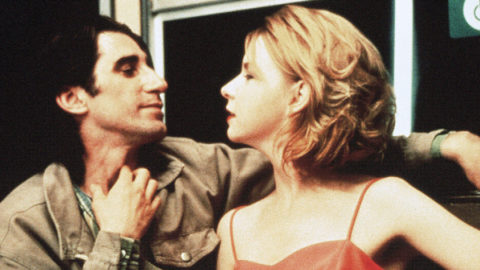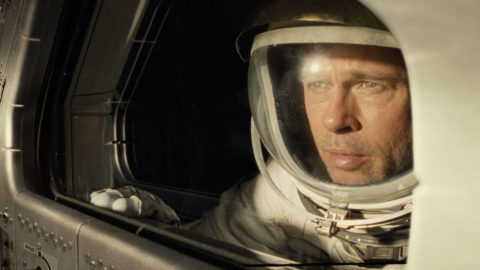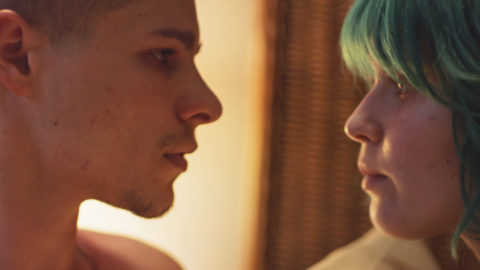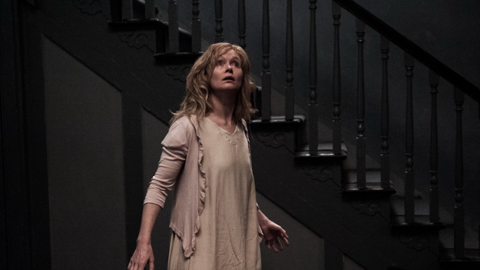Interview: Shannon Murphy
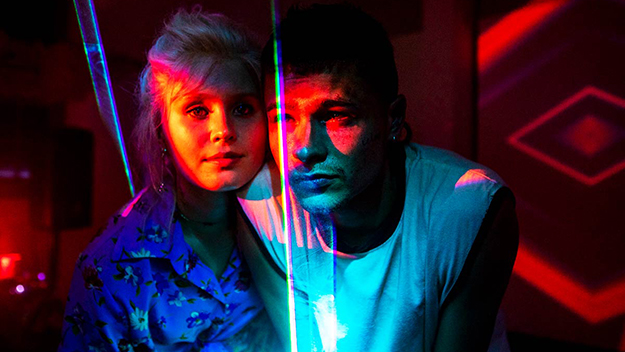
All images from Babyteeth (Shannon Murphy, 2019)
Despite whatever you might presuppose about a film centered on an ill teenager who falls hard for a rakish 23-year-old drug addict, Shannon Murphy’s Babyteeth is a sprightly and electric debut feature. Written by playwright Rita Kalnejais, it’s a funny and formidable chronicle of the moment-to-moment negotiations in a family making the most of a closing window. The Australian ensemble is terrific: Eliza Scanlen (soon to be seen as Beth in Little Women) poignant as Milla, the sick teen; Essie Davis and Ben Mendelsohn both excellent as Milla’s parents; and the elastically energetic Toby Wallace as the interloper, Moses, a role that earned him the Marcello Mastroianni Award for Best Actor in Venice, where the film had its world premiere in competition.
Babyteeth screens in AFI Fest on November 20 and 21. Earlier in the fall, I caught up with Murphy, who’s directed extensively for Australian theater and TV, when she was working on directing episodes for the third season of Killing Eve.
You’ve directed for the stage extensively and the screenplay for Babyteeth is credited to playwright Rita Kalnejais though it doesn’t feel “stagy” at all. Could you talk about how the film came together?
Both Rita and I began our careers in the theater. She had written this play called Babyteeth. I bizarrely hadn’t seen it, but I had heard great things. Our EP Jan Chapman, who produced The Piano and other great Australian films, and Alex Weiss, who was our producer on this, saw the play. They were immediately racing towards each other in the foyer afterward saying, this is it, this is going to be the next film we’re going to make. I think Rita had somehow always felt that it was cinematic even when it was a play. I came onboard only a year and half to two years ago. I was interviewed by Jan and Alex about it. I read it and read a few scripts before that as potential first features, but this one really moved me and it was exactly my sense of humor. And because I’m not a writer, I have to hope that scripts will come my way that feel like my voice.
What struck you as “cinematic” about the play, even just reading it?
There’s nothing in the visuals that would automatically make you think it’s cinematic, because obviously it’s pretty much a four-hand family story. When I went back and read the play, there were these amazing title chapters in it that sound really interesting. I also really love that she would have these moments which said “What the Dead Said to Milla” and they would say things like “Dance, dance, dance.” Or “What the Dead Said to Milla”: “Feel the sun on your skin.” And I said to Rita, was that in the play? And she said, “No, they never put that in there. Just something that I wanted people to think about. It was an essence to contemplate.” And I said, “Well, that’s got to go into the film. They feel like an amazing way to traverse time without having to concentrate too hard on focusing on what day we’re in.” Because it feels like it’s Milla’s voice, and there’s this celestial exchange the moment she realizes, and it’s more of what’s happening to her. So for me the elements that were quite cinematic were definitely in the play, the script.
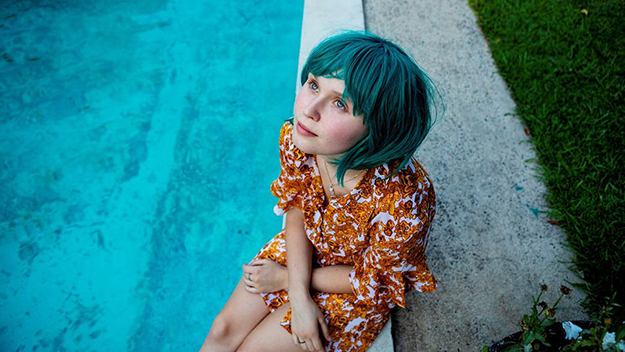
Could you talk about the visual scheme for the film and setting scenes up with DP Andrew Commis? Every single emotion feels fresh as we experience it, all the family interactions.
Andy Commis is a pretty extraordinary cinematographer, because all his films are really different: The Rocket, The Daughter, Girl Asleep are all very different-looking films. I love to find people who don’t just do one thing, because I guess my own work is usually quite versatile at least in theater. I know he’s always trying to respond directly to the material rather than just trying to impose a house style. He and I talked a huge amount about the energy of each of the different characters and the claustrophobic nature of Milla inside that house, which is almost like a glass atrium she’s trapped in. Although it’s a warm, loving family, it’s frustrating. So we would use the camerawork to enhance those elements, but a lot of it is also being really confident and free-flowing with the performance. We talked a huge amount about the characters and what we’re looking for, so that once we were there on the day we can be loose and playful. But having said that, I pre-blocked everything with four other actors before my other actors arrived. I’ve never done that before, but I knew we had a really tight schedule, and it allowed Andy and I to know exactly where people were going to be moving. It allowed us to really craft our shots despite the fact that it feels chaotic.
A lot of planning goes into showing chaos.
And with my design department, we talked so much about how there’s such an incredible duality in this film with the comedy and heartbreak. We wanted to make sure that was there in every frame, always thinking how to keep both alive at all times. So even in a serious moment, there’s still something that’s a little offbeat and maybe bloody humorous, like potentially Moses’s costuming, you know, his shorts and insect legs.
It is a musical film for me. Obviously there’s characters who are musicians, but I just found it has a compelling rhythm of its own.
Yeah, it’s interesting because we think about the musicality of the work all the time. In post, my editor, my cinematographer, and I, we all went to WOMAD [arts festival] together, which is up in Adelaide, and just walked around listening to musicians all over the world. We found the Zephyr Quartet playing there at that festival. We picked a lot of the songs beforehand that Milla dances to, and when they’re on their romantic night out, and when she walks through the art school party. For me it’s really important to find some of that early on, because it makes such a huge difference feeling how those actors are genuinely responding to that music. And then the other music is a collaboration between my composer, music supervisor, and editor, because we all think we’ve got great taste in music…
I hate any rules about how to use music. When I started this, I said to Jan Chapman, “Just so you know, I’m not having any score on this film.” And she nearly had a heartache. Obviously The Piano has the most famous score ever. And I just went, “I don’t want any kind of um, you know…” And what I meant by that was too much composed music that hand-holds sentiment, because that always drives me crazy, even though obviously the music in this is enhancing people’s emotional states. It was always to transport us into Milla’s new outlook on life, basically. It’s something that I do obsess over, because I always think we all have a soundtrack to our own lives and they elicit such a strong response from us and I want the audience to have that.
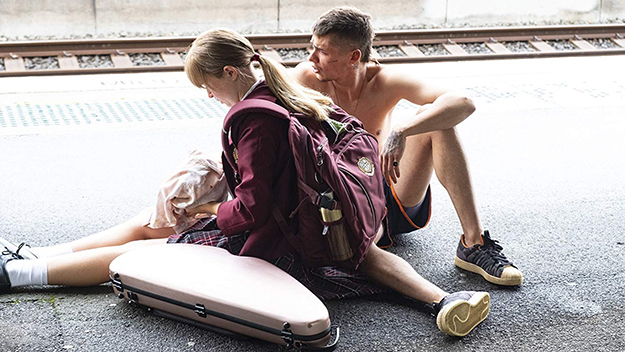
The hand-holding with scores happens so often. At the end of too many movies, you get what I think of in my head as The Piano Tinkling of Great Significance.
Completely, and that’s why I had to be very strong about what I was doing having the music piece at the end with that beach scene. That last scene is like a coda, and it had to sit separately and go somewhere else. And I just went, okay, it’s got to be a bold choice.
Do you use music in your theater work as well?
Yeah, you can. We were a small-budget film with Babyteeth but often theater budget are even smaller, so it can be tricky. But my theater often has a lot of music in it. It’s funny because when I work in TV, I’m like, “No, don’t put music in there.” I’m someone who always tries to avoid music, but then I clearly don’t.
Killing Eve is so orchestrated in every way, tuned in with the music.
Yeah, in fact I’ve listened to the Killing Eve album every day coming to work, so I just constantly have it in my mind.
Going back to blocking, what’s great is you have actors who all have such intense energies, but no one feels like they’re overwhelming any given scene. Could you talk to me about working with Toby Wallace particularly?
I really like actors that are out of the box and playful with their choices. A lot of people ask, “Did you improvise a lot in this?” Well, no, not in terms of script, at all, but I do find that someone like Toby has so much to offer. He has a director’s brain himself, he’d love to be a director one day. But he’s really a complete sponge when it comes to direction, and I’m always pushing them to give me a variety of performances. I like to be able to play with what could be a less obvious choice for a response. So often they are giving me a huge range and I’m playing with that in the edit, but also I get them to be fairly extreme at times—it’s because people do behave like that. But yeah, he is elastic. The first thing I saw Toby in was a TV series called Romper Stomper, which was based on the film Romper Stomper. He played what it would be like if Russell Crowe had a son. It was a very interesting dark character, quite menacing, but then he’s also very heartfelt and playful. He can look like a very distressed addict or he can look like a preppy school boy with just a flick of his head. It’s pretty amazing.
We worked really hard to break him down in terms of his makeup. We put a lot of veins and things on him. He is one of those actors who can take all those elements on board and transform. He also is one of those great actors where he’s so in the moment that afterward when you’re talking to him about it, he doesn’t even know what he did. I’ll go, “Instead of this, can you go…” and he’ll be like, “I don’t know what you’re talking about.” The whole cast are super loose, and they’re all incredible listeners and absorb each other’s energy, which was wonderful.
Eliza Scanlen plays Milla so quietly often and she’s on screen so much, but you’re also thinking about her whenever she’s not. You’re wondering about how she’s dealing with everything. That’s a hard thing to do, to have that imprint with the audience.
She’s a very, very intelligent actress, and she spends a lot of time getting into her character and writing diary entries and doing a lot of research. Like, learning the violin in two weeks, you know. Also on the day she can let go of anything she’s holding onto. There’s a great scene I always think of with Eliza, it’s a really simple exchange when Moses is doing the drug deal and his friend invites her to the party. I remember that night just going, “Oh my gosh, it’s night, I’m running out of time, there’s something out of this scene I’m just not quite getting.” And Eliza just went, “Give me one of those [lollipops] from the catering truck.” I think it was always written that she was eating something, so we gave her that. It’s just all in her look and she sucks on that lollipop while she’s talking… That scene is genius. She can see me getting frustrated and she went no, I’ll solve this and she did.
Another tough scene must have been when Milla and Moses meet: they literally run into each other on a train platform. And that scene goes through all sorts of emotions and tones. It’s intense, kind of erotic in public.
Yeah. It’s funny because when Toby was auditioning for me, he was testing with quite a lot of other actresses, and one day I was like, “I’m getting so sick of this couch.” And I was like, “Why don’t you just pull her all the way to the ground?” And he just did it. And it was so funny and also so full on. From then on, that’s how that scene played out. It’s quite unusual that you would meet the protagonist having a complete anxiety attack. Then she meets this man and from then on, she’s accelerating her life at such a rapid pace and shape-shifting throughout, becoming who she’s been trying to become for a while under her parents’ suffocating environment.
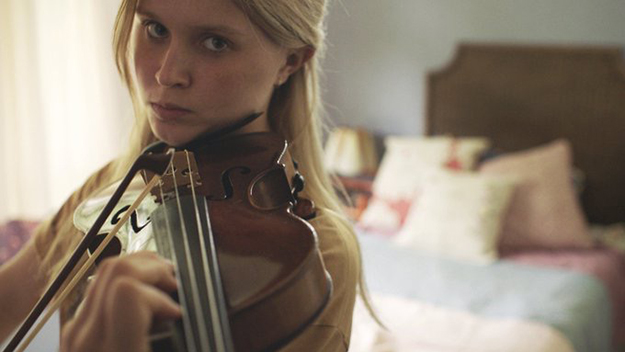
How many shooting days did you have?
We had like five weeks, so it must have been 25 days. But we had to shoot Ben [Mendelsohn] out in the beginning. And so we shot Ben out in like 10 days. That was the bit that was really hard.
His character’s relationship with the neighbor is another remarkable thing. They manage to keep it from being predictable.
They’re both really interesting actors [Emily Barclay and Ben Mendelsohn]. They’re so funny, and they’ve got great, unusual comedic sensibilities, which I really wanted to take advantage of. I just knew they had to have chemistry very quickly.
It’s also fun to see him playing this calm and collected psychiatrist.
He knows that world really well because his father was a psychiatrist, I believe. He can talk about all that very clearly. Yeah, it was interesting to see him be more of a repressed character, but always someone who is so goofy with their humor, because Ben in real life is just so funny.
And Essie Davis as the mother—I had a bit of whiplash because I had seen her in this film and in The Kelly Gang, where she’s just brutal.
I know, Essie can look so different—like when she’s playing Phryne Fisher with that crazy black wig [in a popular Australian mystery series set in 1920s Melbourne] and then she was in The Babadook. She just looks so amazing, and she transforms really well too. She’s someone I always wanted to work with. She’s got this amazing ability to play Anna, for people not to judge her harshly, which was really important to me. Often more uptight, high-strung female characters can be judged unfairly. And it’s very clear why she’s so anxious: she’s got this divided heart between being a creative and trying to take care of her sick child at the same time, and [it’s] what that does when you don’t have your creative outlet anymore or you choose to make that sacrifice and bargain with God in a way—how it can really manifest itself in negative ways. She just did that so, so well.
Are you working on a new feature project?
With the praise for Babyteeth I’m getting scripts coming my way, and so it’s been enjoyable reading the range of projects that are out there. I’m also looking at books that I’m interested in. I don’t think you would know if you love making films until you do it, and I have to say I loved it so much, that I hope it’s not too long before I get to make another one.
The film was such a breath of fresh air. You can get a lot of movies that are trying to do certain things and just turning into something quirky, and this is such a real living, breathing thing.
Thank you. I think a lot of that comes from the fact that I’m such an honest upfront person and that’s the kind of storytelling that I like. Andy and I often talk about Cassavetes’ work, or a great film like Breaking the Waves. Even though Breaking the Waves is different because she does a huge monologue to the camera, it’s very raw and believable. Even with all the chaos [in Babyteeth], it’s still grounded in reality, and people would really behave like that and say those things. It’s not over-sentimentalized because that’s not how people respond in the world, you know? People don’t go around like, “Look at me, how sick am I? How sad, look at me.” You know “feel for me.” It’s not the reality of those experiences, and we just wanted to make that authentic. I’m honest with the actors and they give me the same. It’s important—you have to be what you expect from others, I think.



